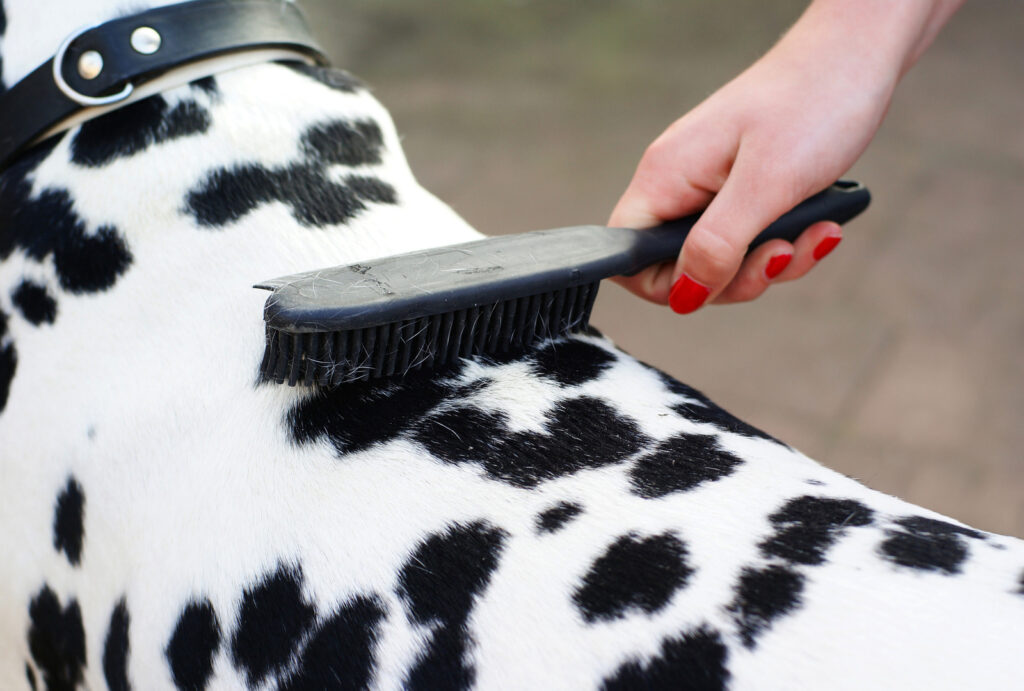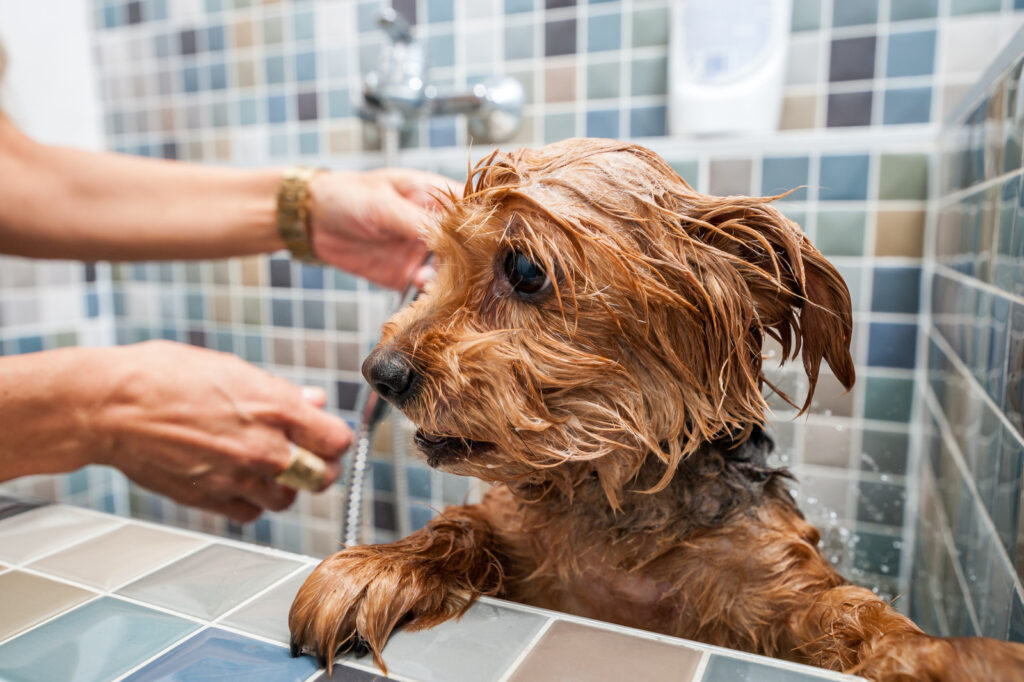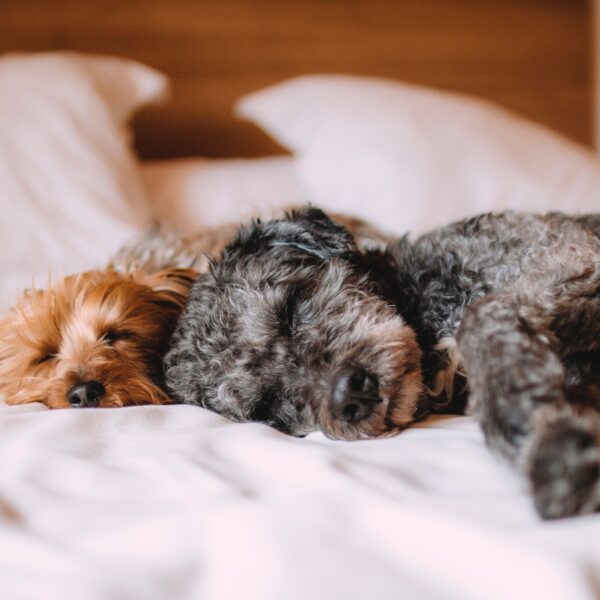Home-grooming guide.
We all know that pups can get mucky- whether it’s from running in the mud, nosing through bushes or rolling around in nastiness. And, while some pooches are messier than others, all pups eventually end up needing a good old wash- whether they like it or not! More info on how often to wash your dog below.
Washing and grooming your pet at home not only gives you a chance to thoroughly check them over, but it can also be a great bonding experience.
Dog grooming at home
Grooming enables your pup to stay healthy, comfortable, and clean. But if you’re planning to groom your pooch at home, it’s always best to be as clued up as possible. To make things easier, Vital Pet Club has come up with handy equipment lists, as well as step-by-step instructions on how to successfully wash and groom your pup from the comfort of your own home.

How to groom your dog before washing:
Equipment:
- A suitable brush or comb. The type of brush or comb you’ll need will vary depending on the length of your pup’s coat. For example, curry brushes or brush gloves are normally suitable for short-haired dogs, whereas medium to long-haired breeds will need to be groomed with a slicker, undercoat rake, steel comb or pin brush
- Clippers to cut away any tangles or mats
- An ear cleaning solution– but always make sure the cleaner is safe for use in dogs
Grooming steps:
- Comb or brush your dog first. Not only does this help to prevent mats, but it can also redistribute skin oils over the coat and skin. This step can also be great for bonding with your pup.
- Cut out any mats or tangles that cannot be brushed out. Make sure you are really careful when you do this by ensuring that you hold your clipper blade parallel to your pup’s skin and always feeling them with your hand to make sure they aren’t getting too hot!
- If your dog has mucky, waxy ears, you can gently clean them using an ear cleaner that’s safe for dogs. If you’re not sure how to safely clean your pup’s ears, ask your vet for advice.
How to wash your dog:
Equipment-
- A shampoo that’s made especially for dogs.
- Tasty treats! Especially if your pup is wriggly and easily distracted
- Lots of towels to prevent your pup from slipping in the tub and to dry them off after washing. You can also use a hairdryer- but make sure to always use a low temperature to ensure you don’t scald your pup!
- A bath or plastic tub (if you are washing your pup outside)
Steps to wash your pup:
- Place a towel or non-slip bathmat at the bottom of the bath or tub.
- Make sure the shower water is lukewarm. If the water is too hot or cold, it may be uncomfortable for your pup, or may even burn them!
- Gently place your pooch in the tub.
- Carefully read the instructions on the dog shampoo. There should be specific dilution instructions, as well as advice on general use.
- Soak your pup with water. Make sure your fur baby is completely wet before using any dog shampoo but try to avoid getting water in their eyes or ears. You can do this by spraying water from the shower directly onto your pup right up to their neck- but be sure to soak the head and face separately using a cloth or towel.
- Add shampoo and lather. Shampoo your pup right up to their neck, creating a foam by massaging your pup’s coat. You can do this by moving your fingers in gentle circular motions, making sure you work the lather right into your pup’s coat to give them a proper clean! Once you reach your pups head, again use a washcloth or towel, to ensure you don’t get any shampoo in the eyes or ears- ouch!
- Rinse your pup thoroughly- keep going until there are no bubbles left!
- Towel-dry your pooch. It’s normally easiest to do this whilst your pup is still in the bath or tub. Some medium or long-haired pups will also need to be dried with a hairdryer- but always use dryers on a cool setting to avoid scalding your pup!

Can you use human shampoo for dogs?
You should always make sure you use a shampoo that has been specially made for dogs. And if you’re not sure- always check the label!
It’s really important to avoid using human or baby shampoos on your dog because they can contain harsh chemicals that may damage or irritate your pup’s skin or be toxic when licked.
How often should you wash your dog?
As a general rule, owners should aim to wash their pup at least once every couple of months. However, this can vary depending on how active your pup is, whether they have a long or short coat and how much they like to get mucky! It will also depend on whether your pup has any allergies or skin conditions- and you can find out more about itchy skin in pups here.
Whilst no-one wants a grubby pup, it’s important not to over-wash your pooch, as this can remove important natural oils that are essential for healthy skin.
When can I bathe my puppy?
Puppies should not be re-homed from the breeder until they are over 8 weeks old, and are normally big enough to bathe safely at this stage.
However, if you are breeding puppies yourself, it’s best to wait until your puppy is at least 7-8 weeks old before giving them their first bath. If your pup becomes mucky or smelly before they’re 8 weeks, it’s best to gently wash them with a warm damp cloth, rather than give them a full bath.
When your pup is old enough to start having baths, make sure you only bathe them when absolutely necessary (when they get stinky or covered in muck) and make sure you leave longer intervals in between baths than you would in an adult dog. This is because it’s important not to wash your baby dog too much because puppies’ skin is often more sensitive and will become dry and itchy if bathed too quickly.
Finally, try to make bath time fun! By using your puppies’ toys in the bath, and making a fuss of them during bathing, your puppy will learn to love bathing, making bath time more enjoyable for both you and your fur baby!
Want to know more about puppies? Check out VPC’s advice for new pet parents.


